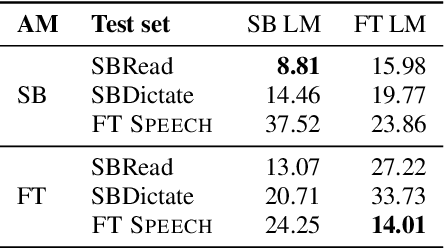Marija Stepanović
From Masked Language Modeling to Translation: Non-English Auxiliary Tasks Improve Zero-shot Spoken Language Understanding
May 15, 2021



Abstract:The lack of publicly available evaluation data for low-resource languages limits progress in Spoken Language Understanding (SLU). As key tasks like intent classification and slot filling require abundant training data, it is desirable to reuse existing data in high-resource languages to develop models for low-resource scenarios. We introduce xSID, a new benchmark for cross-lingual Slot and Intent Detection in 13 languages from 6 language families, including a very low-resource dialect. To tackle the challenge, we propose a joint learning approach, with English SLU training data and non-English auxiliary tasks from raw text, syntax and translation for transfer. We study two setups which differ by type and language coverage of the pre-trained embeddings. Our results show that jointly learning the main tasks with masked language modeling is effective for slots, while machine translation transfer works best for intent classification.
FT Speech: Danish Parliament Speech Corpus
May 25, 2020

Abstract:This paper introduces FT Speech, a new speech corpus created from the recorded meetings of the Danish Parliament, otherwise known as the Folketing (FT). The corpus contains over 1,800 hours of transcribed speech by a total of 434 speakers. It is significantly larger in duration, vocabulary, and amount of spontaneous speech than the existing public speech corpora for Danish, which are largely limited to read-aloud and dictation data. We outline design considerations, including the preprocessing methods and the alignment procedure. To evaluate the quality of the corpus, we train automatic speech recognition systems on the new resource and compare them to the systems trained on the Danish part of Spr\r{a}kbanken, the largest public ASR corpus for Danish to date. Our baseline results show that we achieve a 14.01 WER on the new corpus. A combination of FT Speech with in-domain language data provides comparable results to models trained specifically on Spr\r{a}kbanken, showing that FT Speech transfers well to this data set. Interestingly, our results demonstrate that the opposite is not the case. This shows that FT Speech provides a valuable resource for promoting research on Danish ASR with more spontaneous speech.
 Add to Chrome
Add to Chrome Add to Firefox
Add to Firefox Add to Edge
Add to Edge